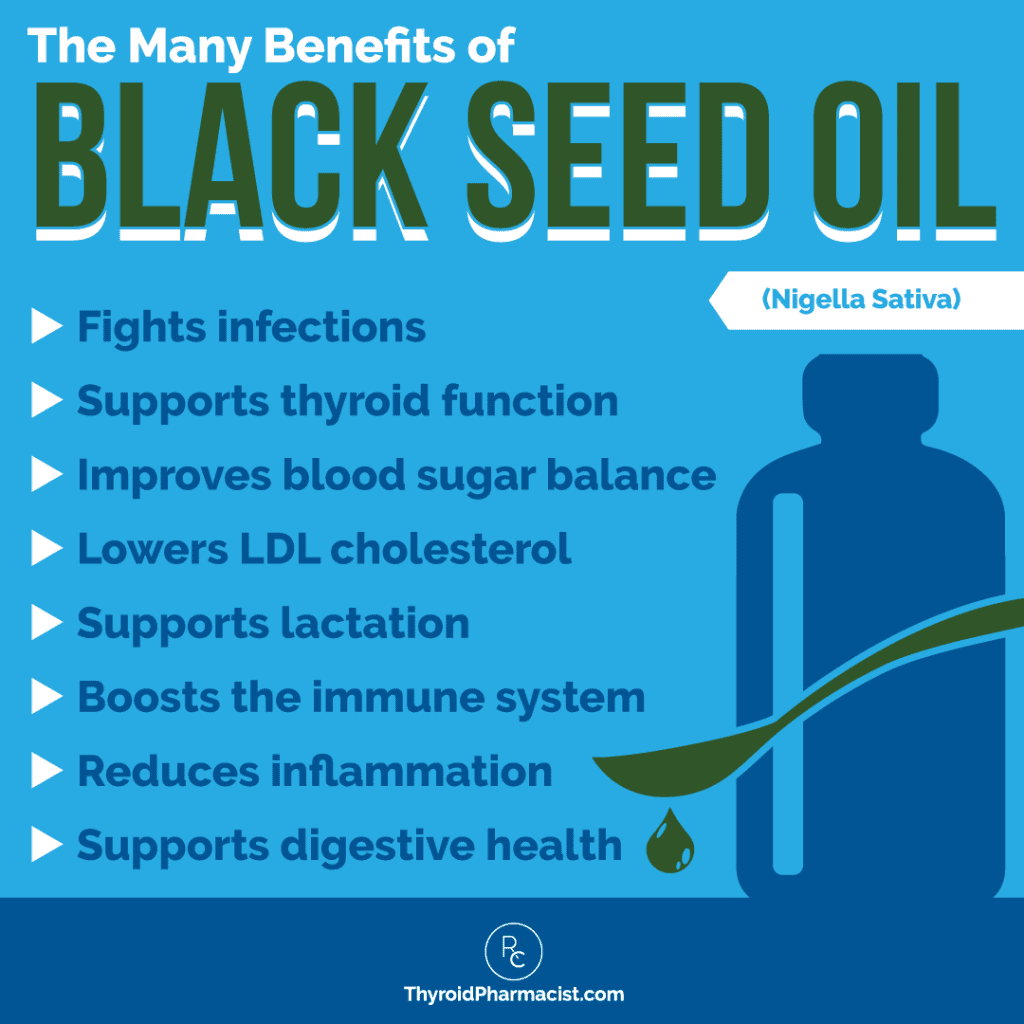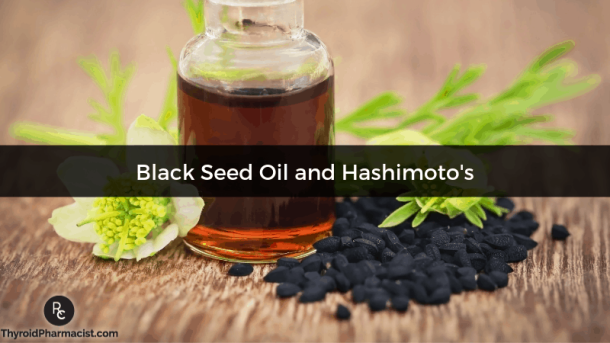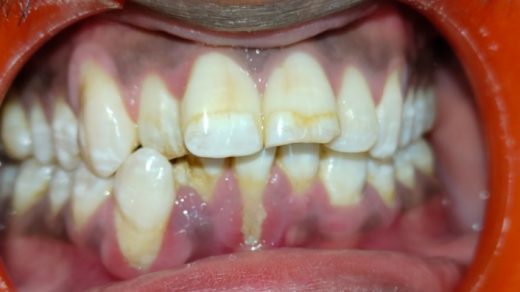Over the past few years, my mission to help people recover from Hashimoto’s has become increasingly focused on using food as medicine (or food pharmacology) to address many of the root causes and symptoms of thyroid conditions. In addition to incorporating healing foods into my diet, I’ve also discovered many herbs and spices that can have profound benefits for healing. I’m always on the lookout for new research that could point us toward another tool to help us on our healing journeys.
Black seed oil has been on my radar for some time, especially since clinical trials started being published, revealing some possible benefits for those of us with Hashimoto’s thyroiditis. Some readers and clients in my community have asked about black seed oil, as they have heard about it being used for its medicinal properties and have been curious about it. One Root Cause Reset member recommended it for seasonal allergies. My curiosity was piqued, and I wanted to look into black seed oil and its effects on the thyroid, for my community.
Black seed oil has been touted as a “cure for everything except for death!”. I personally had a chance to use it myself twice in 2018, after the birth of my son. The first time I used black seed oil was to help support lactation. Black seed oil is an herb that is safe to use while breastfeeding. It’s actually considered a galactagogue, which means it can help to increase milk supply. [1]
Around four months after the birth of my son, I started to experience hair loss and new food sensitivities. I also found that my voice was becoming more hoarse. I tested my thyroid antibodies and they were elevated above 100 IU/mL — my Hashimoto’s was no longer in remission! (Under 100 IU/mL is considered in remission by many professionals.) While the antibodies weren’t as high as when I had started my journey (over 2000 IU/mL), I was concerned. I wasn’t sure if the Hashimoto’s was flaring up, or if it was postpartum thyroiditis. Luckily, I knew a thing or two about reducing Hashimoto’s antibodies and getting Hashimoto’s back into remission (the same principles apply to postpartum thyroiditis). 😉
At that point, I tested myself with the GI-MAP test (my favorite gut test) and found that I had H. pylori, a common trigger of Hashimoto’s and food sensitivities. [2] I was excited because I knew that treating this infection usually results in a reduction of thyroid symptoms and thyroid antibodies, but wasn’t sure about which protocol I would use, as many of the herbs I would typically use for H. pylori, are not safe to take while breastfeeding.
I reached out to my friend and colleague Dr. Maya Shetreat-Klein, and learned that black seed oil could be used against H. pylori. I used it along with propolis, and that did the trick — within a few weeks, my hoarse voice was gone, my hair stopped falling out, and my follow-up tests showed no more H. pylori. Even better, my thyroid antibodies were reduced! I also did another gentle protocol with black seed oil, to combat another H. pylori flare back in 2020. As such, I’ve been wanting to dig deeper into this wonderful herb and get the message out about its many benefits.
This article will explain how black seed oil, which has grown in popularity in the medical world, may be a game changer and get you one step closer to putting Hashimoto’s into remission. In this article, you will learn:
- What is black seed oil?
- The uses and benefits of black seed oil
- How black seed oil can impact thyroid hormone levels, fight gut infections, improve blood sugar levels, and balance cholesterol
- Black seed oil supplement recommendations
What is Black Seed Oil?
Black seed oil is derived from a plant that goes by many different names. Aside from its botanical name, Nigella sativa, it is also known as black cumin or black cumin seed. However, be careful not to confuse this plant with true culinary cumin (Cuminum cyminum), black pepper, black sesame, or black cohosh. The seeds are black on the outside and white in the middle, and produce a bitter taste.
Black seed oil is native to Southern Europe, North Africa, and Southwest Asia. Over time, it has spread further throughout the Middle East, where it is cultivated and carries with it a long history of religious and medicinal use. [3] The earliest archeological evidence suggesting cultivation, dates back to ancient Egypt and the tomb of Tutankhamen. It was also given credit for the beauty secret of Queen Nefertiti, who used black seed oil. Black seed oil is even mentioned in the Bible as the Hebrew “Ketzah,” a spice used in bread. Interestingly, the Arabic phrase for black seed oil, “Hibbatul barakah,” means “the seed of blessing.”
Black seed oil has likely been used as a medicinal herb for 3000 years or more, and its use has been documented in Ayurveda, Unani, Tibb, Siddha, and other systems of medicine. [4]
It has historically been used as a remedy for a variety of health conditions — most notably, for inflammation, cardiovascular health, infections, and skin issues. In addition to being used for vomiting, diarrhea, headaches, and the common cold, it was often prescribed as a tonic for general wellness.
Uses and Benefits of Black Seed Oil
Many of the medicinal properties of black seed oil are attributed to the compounds it contains, including thymoquinone (TQ), thymohydroquinone (THQ) and dihydrothymoquinone (DHTQ). The plant also contains many other active components, including thymol, alkaloids, saponins, and terpinenes.
The largest active component, TQ, makes up 30-48 percent of the essential oil of black seed oil, and offers the main biologic and pharmacologic effects. [5] Thymoquinone is an antioxidant and antihistamine. [6] It is also antimicrobial, antifungal and anti-inflammatory, and can modulate the immune system. It has been shown to protect the stomach lining, liver, kidneys and brain. Data shows TQ to have a low level of adverse effects and no serious toxicity.
Black seed oil also contains the antifungal compounds thymol and THQ.
The compounds found in black seed oil, which have been studied in animals and humans extensively, have also been found to protect the liver, kidneys, cardiovascular system, and gastrointestinal system. Furthermore, it has demonstrated antidiabetic, anticancer, and antiasthmatic properties.
Black Seed Oil Benefits for Hashimoto’s
Black seed oil shows promise for positively influencing thyroid health and lowering thyroid stimulating hormone (TSH). It may also play a role in addressing some of the individual root cause issues that contribute to Hashimoto’s, including gut health, blood sugar imbalances, and metabolic health. Let’s explore some of the recent evidence in further detail.
Thyroid Function
Although there is a lot of data on black seed oil, there had been little study in the Hashimoto’s population, until a 2016 Iranian study looked at the therapeutic use of black seed oil in people with Hashimoto’s thyroiditis. [7]
Participants between the ages of 22 and 50 received either 2 grams per day of black seed oil, or 2 grams per day of placebo, for eight weeks. Participants were also treated with levothyroxine from six weeks prior to the study, through the end of the trial.
At the beginning of the trial, there were no significant differences between the two groups. At the end of the eight week trial, the group receiving the black seed oil saw a reduction in weight, as well as in waist and hip circumference, compared to the placebo group.
During the trial, serum thyroid stimulating hormone (TSH) levels reduced from an average of 6.42 mIU/l to 4.13 mIU/l in the group receiving the black seed oil. Serum T3 also improved from an average of 0.92 mmol/l, to an average of 1.06 mmol/l. Both of these changes were statistically significant. (Anti-TPO antibodies were also reduced during the study, though this change was not considered to be statistically significant.)
This study also had a meaningful impact on Vascular Endothelial Growth Factor (VEGF), a protein that stimulates the formation of blood vessels and plays a specific role in the normal function and development of thyroid cells.
The study’s authors primarily attribute the positive changes to body composition and thyroid function to the anti-inflammatory and antioxidant properties of thymoquinone.
Since then, a slew of new studies have illustrated its potential uses and benefits for Hashimoto’s. Currently, black seed oil is one of the most cited plants being used for treatment of hypothyroid disorders. [8]
A 2020 study on patients with Hashimoto’s showed that treatment with black seed oil significantly increased total antioxidant capacity, which is important because those with Hashimoto’s typically have a lot of oxidative stress. [9] The study also showed that participants receiving the black seed oil saw a reduction in body mass and a reduction in LDL cholesterol, while HDL cholesterol levels improved.
Other recent studies have solidified black seed oil’s ability to improve thyroid hormones. A study conducted on hypothyroid rats in 2022 found that black seed oil raised T3 levels, and another study showed that a powder of black cumin seed was able to raise T3 levels over a period of eight weeks, while also reducing the synthesis of anti-TPO antibodies. [10] A 2020 study on hypothyroid rats showed that oral administration of black seed oil over four weeks was able to improve TSH levels. [11]
Black seed oil may also be protective for the livers and kidneys. In Hashimoto’s, impaired detoxification is a common issue, so this is another way in which we can support our systems. One study showed that TQ was able to restore normal liver function in hypothyroid rats who displayed nonalcoholic fatty liver disease. [12] Another study showed that TQ’s antioxidant properties may have a protective effect against hypothyroidism-induced kidney injury. [13]
Lastly, black seed oil has also been shown to have a gastroprotective effect on the formation of stress-induced gastritis. One study found that administration of black seed oil to rats over a period of 15 days showed a reduced number of ulcers and lesions in their guts. [14] The study attributed this to the antihistaminic effects of black seed oil, as well as its potent antioxidant effects. Supporting the gut is one of the most important things you can do for Hashimoto’s, as every person with Hashimoto’s will have some level of gut dysfunction.
I’m excited that so much new research is showing the benefits of black seed oil for Hashimoto’s. 🙂
Anti-Inflammatory
One way black seed oil can improve Hashimoto’s is through its anti-histamine properties. A component of black seed oil called “nigellone” can prevent the release of histamine from cells. [15] Not only does this help reduce inflammation-related conditions such as asthma and allergies, it also helps modulate autoimmune responses.
One study found that black seed oil can control allergic disorders through this mechanism (and also by decreasing inflammatory cells such as eosinophils, and inhibiting the IgE immune response). [16] The study also showed that this benefit was achieved without any signs or symptoms of noticeable toxicity.
The antioxidant effect of TQ is responsible for black seed oil’s anti-inflammatory properties. Not only does it preserve the activity of important antioxidants like glutathione, it also acts as a free radical scavenger itself. It has also been found that the flavonoids in black seed oil can enhance gastric mucus and strengthen the gut’s immune defense. [17] We know that healing the gut is an essential part of healing Hashimoto’s, so it’s always exciting to discover another way that we can support our healing.
Infections
Besides impacting the thyroid directly, black seed oil may play a role in addressing the root causes that contribute to Hashimoto’s thyroiditis, such as infections. (Often, infections can trigger autoimmune thyroid disease, and treating infections can help reverse the condition.)
Black seed oil is well demonstrated to have antibacterial properties. [18] It has been shown to inhibit the growth of Staphylococcusaureus, a cause of potentially life-threatening Staph infections that may be present in the imbalanced gut flora of people with autoimmunity. [19] The constituents TQ and melanin, found in black seed oil, may show promise in cases where an alternative to antibiotics is desired, or the bacteria has become resistant to antibiotics.
The antibacterial properties of black seed oil may also play a role in the treatment of H. pylori, a bacterial infection in the stomach that is common in those with Hashimoto’s. [20] TQ acts as a biofilm disruptor, meaning that it can break through the protective coating that H. pylori uses to protect itself, allowing antibacterial components to reach the H. pylori bacteria and eradicate the infection. I typically find that it works better in combination with other treatments, rather than a standalone for H pylori.
What’s more is that black seed oil has been shown to be gastro-protective in both human and rat studies. One rat study specifically looked at gastritis in rats with hypothyroid function and found that low thyroid function can be a trigger for gastritis. It also found that black seed oil can play a therapeutic role by inhibiting free radical generation and increasing levels of antioxidants that protect against oxidative stress in gastric tissue. [21]
Candida is another infection that may play a role in the development of Hashimoto’s. In this case, Candida is a fungus that can overgrow in the digestive system and other areas of the body. (Click here to read more about Candida and Hashimoto’s.) Given that the active constituents of thymol, TQ, and THQ in black seed oil are well known for their antifungal effects, black seed oil may be an antifungal option in the treatment of Candida. [22]
Along with its antibacterial and antifungal effects, black seed oil also has potent antiparasitic benefits. [23] It has been shown to eliminate parasites such as Trichomonas vaginalis, Schistosoma mansoni, Leishmania major, and Plasmodium yoelii. One study found that a preparation of black seed oil and alcohol was just as effective as metronidazole, a conventional antifungal medication, at eliminating Trichomonas vaginalis (the most common non-viral sexually transmitted disease). [24]
Many of the drugs that are typically used to treat parasites were developed many years ago, and some parasites have become resistant to them. This is why it’s been so important to find alternatives. A 2016 study found that TQ was able to eradicate 96.8 percent of Entamoeba histolytica and 96.62 percent of Giardia lamblia. For comparison, metronidazole only eradicated 70.9 percent of the parasites. [25]
As parasitic infections can also be a root cause of autoimmune thyroid conditions, black seed oil can support thyroid health for the long term, and be a beneficial supplement to add to your “medicine” cabinet.
Blood Sugar and Cholesterol Balance
Blood sugar imbalance, and even diabetes, are common co-occuring conditions in people with Hashimoto’s. [26] I often recommend stabilizing blood sugar as one of the first interventions when addressing your thyroid symptoms.
Black seed oil has demonstrated potential as an anti-diabetic agent and may play a supportive role in increasing insulin sensitivity (decreasing insulin resistance) in both animal and human studies. In a 3-month clinical trial with 94 diabetes patients, the black seed oil group experienced reduced blood sugar, both in fasting blood sugar and post-meal blood sugar. [27] A three-month average of the patients’ blood sugar (measured through hemoglobin A1C levels) also showed a significant reduction during the black seed oil trial period. Additionally, insulin resistance was reduced and beta cell function increased. (Beta cells are the cells in the pancreas that produce insulin.) The trial used dosages of 1, 2 and 3 grams of black seed oil per day, and found that the 2 gram per day dose was the most effective.
In a review of seven clinical trials, black seed oil showed promising results in improving glucose and lipids in type 2 diabetes. [28] Oftentimes, improvements in blood sugar go hand in hand with improvements in lipids, or cholesterol. This seems to be the case in the studies that have looked at metabolic health in relation to black seed oil.
A review of the data from the Iranian study regarding the use of black seed oil for Hashimoto’s uncovered that, not only did the trial group receive the benefits of lowered TSH and antibodies, as well as improved T4 to T3 ratio, weight, and anthropometric measurements (body composition), but they also saw an improvement in serum lipids. [29] In the study group, LDL cholesterol and triglycerides decreased, and HDL cholesterol significantly increased, compared to the group receiving the placebo over the 8-week trial. The study suggests that there are benefits to using black seed oil as an adjunct therapy in Hashimoto’s thyroiditis.

Side Effects/Precautions
The claims for the use of black seed oil are widespread and range from improving liver health to helping with asthma, as my Root Cause Reset participant suggested. Overall, black seed oil seems quite safe to use, with minimal side effects.
In the clinical trial of black seed oil with Hashimoto’s, nausea and itching were observed, and no other side effects were noted.
Please note, however, that black seed oil is processed through specific enzyme pathways in the liver and therefore, at least theoretically, could interact with medications that use the same pathways.
Furthermore, some formulas may not be safe for those with gallbladder issues. Additionally, black seed oil is an anticoagulant, or blood thinner, and shouldn’t be taken by those who have a bleeding disorder and/or are on medications that affect blood clotting.
It is always best to check with your doctor or pharmacist before beginning a new herbal supplement, to check for the possibility of interactions.
Black Seed Oil Supplements
Black seed oil supplements are available in a variety of forms that may be beneficial for different concerns. The most common therapeutic dose in the studies reviewed for this article was 2 grams per day. Human studies of black seed oil range from 8 weeks to 12 months of use. Safe doses go as high as 40 milligrams per kilogram of body weight. It is recommended to use black seed oil consistently for at least eight weeks before re-checking thyroid, blood sugar, or cholesterol lab work.
There are a few different ways you can take black seed oil:
- Liquid: Black seed oil itself can be taken orally in liquid form, such as this cold-pressed version from Kiva. Approximately ½ teaspoon contains a 2 gram dose. The oil can also be added to a carrier oil and massaged into the scalp for hair benefits, or applied directly to problem areas of the skin. I will say that it’s not the most pleasant tasting liquid, to say the least. 🙂 Most people who have tried it use the word “motor oil” to describe the taste, texture and smell. Please do not add it to your smoothies unless you want to ruin them, haha! #thingsIlearnedthehardway
- Powder: Nigella sativa powder is also available commercially. Look for ground black cumin seed options like this one. A 2 gram dosage can be measured with the scoop that is usually provided. Again, don’t add it to smoothies!
- Capsule: I was pleased to learn that Nigella sativa can also be utilized as a capsule, and so I created one for Rootcology. A capsule might be the easiest way to take black seed oil orally. I recommend Rootcology’s Black Cumin Seed Extract, which is combined with vitamin E for a synergistic effect to boost its anti-inflammatory properties. (Please note you should not take this product if you’re taking any of the following medications: alkylating agents, anticoagulant/antiplatelet drugs, antitumor antibiotics, blood thinners, cyclosporine, cytochrome P450 substrates (3A4), and/or selumetinib.)
Monitoring Your Thyroid Hormones When Taking Black Seed Oil
Whenever you start a lifestyle or complementary intervention to address Hashimoto’s, I encourage you to work with your doctor to monitor your thyroid symptoms, thyroid hormones, and thyroid antibodies. This is a great idea for any lifestyle intervention, but a must for lifestyle changes that could impact your TSH, like black seed oil, especially if you are already taking thyroid medications.
Studies have shown that black seed oil can impact thyroid hormones. In the Iranian study I’ve mentioned several times, TSH levels reduced from an average of 6.42 mIU/l to 4.13 mIU/l in the group receiving the black seed oil over a period of eight weeks.
This means that black seed oil could lower/normalize TSH in some cases, thus potentially reducing your requirement (or need) for thyroid meds. So as you move forward with supplementation, please look out for the following symptoms of being overmedicated: rapid or irregular heartbeat, nervousness, irritability or mood swings, muscle weakness or tremors, diarrhea, heat intolerance, menstrual irregularities, hair loss, weight loss, insomnia, chest pain, and/or excessive sweating.
I recommend testing thyroid hormone levels every six to 12 weeks while using complementary therapies, including root cause medicine, diet, or supplements, to ensure your thyroid medication dosage is optimized – or sooner, if you are showing any of the above symptoms. Thyroid medications are goldilocks hormones – they need to be used in just the right dose – and there are risk factors of being over-medicated.
Testing TSH, T4, T3, and the two most common Hashimoto’s antibodies, TPO and TG antibodies, is an important part of ensuring that the lifestyle changes you are making are both safe and helpful. 🙂 (You can read more about tests here.)
If your doctor is ordering these thyroid labs for you, be sure to request a copy so that you can see them for yourself and ensure that they are interpreted correctly. If you aren’t able to use your physician for ordering, or have a high deductible insurance plan like I do, you may also wish to self-order your own thyroid monitoring labs. I recommend the Ulta Labs thyroid panel for monitoring your progress, which can be ordered anywhere in the U.S. (some, but not all, insurance companies may reimburse you for self-ordered labs, so please be sure to check with your plan).
Takeaway
I find black seed oil to be incredibly interesting, with an intriguing history and science behind it. It holds promise as one piece of the thyroid health puzzle, in its ability to balance thyroid hormones, treat infections, and stabilize blood sugar and cholesterol. If I come across any other important studies, I will be sure to write about them on this blog.
For more information regarding addressing your personal root causes of Hashimoto’s, see my book Hashimoto’s Protocol, and for recipe ideas that are thyroid supportive, check out my cookbook Hashimoto’s Food Pharmacology: Nutrition Protocols and Healing Recipes to Take Charge of Your Thyroid Health. If you believe your adrenals are part of your Hashimoto’s root causes, I’d also recommend checking out my newest book, Adrenal Transformation Protocol.
I wish you all the best on your healing journey!
Now I’d love to hear from you. Have you tried a black seed oil supplement? If so, what has been your experience?
P.S. You can download a free Thyroid Diet Guide, 10 thyroid-friendly recipes, and the Nutrient Depletions and Digestion chapter of my first book for free by signing up for my newsletter. You will also receive occasional updates about new research, resources, giveaways, and helpful information.
For future updates, make sure to follow us on Facebook, and Instagram, TikTok, and Pinterest!
References
[1] Foong SC, Tan ML, Foong WC, Marasco LA, Ho JJ, Ong JH. Oral galactagogues (natural therapies or drugs) for increasing breast milk production in mothers of non-hospitalised term infants. Cochrane Database Syst Rev. 2020;5(5):CD011505. Published 2020 May 18. doi:10.1002/14651858.CD011505.pub2
[2] Shmuely H, Shimon I, Gitter LA. Helicobacter pylori infection in women with Hashimoto thyroiditis: A case-control study. Medicine (Baltimore). 2016;95(29):e4074. doi:10.1097/MD.0000000000004074
[3] Ahmad A, Husain A, Mujeeb M, et al. A review on therapeutic potential of Nigella sativa: A miracle herb. Asian Pac J Trop Biomed. 2013;3(5):337-352. doi:10.1016/S2221-1691(13)60075-1
[4] Ijaz H, Tulain UR, Qureshi J, Danish Z, Musayab S, Akhtar MF, Saleem A, Khan KK, Zaman M, Waheed I, Kahn I, Abdel-Daim M. Review: Nigella sativa (Prophetic Medicine): A review. Pakistan Journal of Pharmaceutical Science. 2017; 30(1): 229-234
[5] Darakhshan S, Bidmeshki Pour A, Hosseinzadeh Colagar A, Sisakhtnezhad S. Thymoquinone and its therapeutic potentials. Pharmacological Research. 2015; 95-96: 138-58. doi: 10.1016/j.phrs.2015.03.011
[6] Khader M, Eckl PM. Thymoquinone: an emerging natural drug with a wide range of medical applications. Iran J Basic Med Sci. 2014;17(12):950-957.
[7] Farhangi M, Dehghan P, Tajmiri S, Abbasi M. The effects of Nigella sativa on thyroid function, serum Vascular Endothelial Growth Factor (VEGF)-1, Nesfatin-1 and anthropometric features in patients with Hashimoto’s thyroiditis: a randomized controlled trial. BMC Complementary and Alternative Medicine. 2016; 16: 471. doi: 10.1186/s12906-016-1432-2
[8] Taïbi K, Ait Abderrahim L, Helal F, Hadji K. Ethnopharmacological study of herbal remedies used for the management of thyroid disorders in Algeria. Saudi Pharm J. 2021;29(1):43-52. doi:10.1016/j.jsps.2020.12.004
[9] Farhangi MA, Tajmiri S. The effects of powdered black cumin seeds on markers of oxidative stress, intracellular adhesion molecule (ICAM)-1 and vascular cell adhesion molecule (VCAM)-1 in patients with Hashimoto’s thyroiditis. Clin Nutr ESPEN. 2020;37:207-212. doi:10.1016/j.clnesp.2020.02.015
[10] Avci G, Ulutas E, Ozdemir V, Kivrak I, Bulbul A. The positive effect of black seed (Nigella sativa L.) essential oil on thyroid hormones in rats with hypothyroidism and hyperthyroidism. J Food Biochem. 2022;46(4):e13801. doi:10.1111/jfbc.13801; Farhangi MA, Tajmiri S. The effects of powdered black cumin seeds on markers of oxidative stress, intracellular adhesion molecule (ICAM)-1 and vascular cell adhesion molecule (VCAM)-1 in patients with Hashimoto’s thyroiditis. Clin Nutr ESPEN. 2020;37:207-212. doi:10.1016/j.clnesp.2020.02.015
[11] Nasr El-Din WA, Abdel Fattah IO. Histopathological and biochemical alterations of the parotid gland induced by experimental hypothyroidism in adult male rats and the possible therapeutic effect of Nigella sativa oil. Tissue Cell. 2020;65:101366. doi:10.1016/j.tice.2020.101366
[12] Ayuob NN, Abdel-Hamid AAHM, Helal GMM, Mubarak WA. Thymoquinone reverses nonalcoholic fatty liver disease (NAFLD) associated with experimental hypothyroidism. Rom J Morphol Embryol. 2019;60(2):479-486.
[13] Ayuob N, Balgoon MJ, El-Mansy AA, Mubarak WA, Firgany AEL. Thymoquinone Upregulates Catalase Gene Expression and Preserves the Structure of the Renal Cortex of Propylthiouracil-Induced Hypothyroid Rats. Oxid Med Cell Longev. 2020;2020:3295831. Published 2020 Jul 20. doi:10.1155/2020/3295831
[14] Abdel-Sater KA. Gastroprotective effects of Nigella Sativa oil on the formation of stress gastritis in hypothyroidal rats. Int J Physiol Pathophysiol Pharmacol. 2009;1(2):143-149. Published 2009 Mar 10.
[15] Ahmad MF, Ahmad FA, Ashraf SA, et al. An updated knowledge of Black seed (Nigella sativa Linn.): Review of phytochemical constituents and pharmacological properties. J Herb Med. 2021;25:100404. doi:10.1016/j.hermed.2020.100404
[16] Shahzad M, Yang X, Raza Asim MB, et al. Black seed oil ameliorates allergic airway inflammation by inhibiting T-cell proliferation in rats. Pulm Pharmacol Ther. 2009;22(1):37-43. doi:10.1016/j.pupt.2008.11.006
[17] Ahmad MF, Ahmad FA, Ashraf SA, et al. An updated knowledge of Black seed (Nigella sativa Linn.): Review of phytochemical constituents and pharmacological properties. J Herb Med. 2021;25:100404. doi:10.1016/j.hermed.2020.100404
[18] Forouzanfar F, Bazzaz BS, Hosseinzadeh H. Black cumin (Nigella sativa) and its constituent (thymoquinone): a review on antimicrobial effects. Iran J Basic Med Sci. 2014;17(12):929-938.
[19] Bakathir HA, Abbas NA. Detection of the antibacterial effect of Nigella sativa ground seeds with water. Afr J Tradit Complement Altern Med. 2011;8(2):159-164. doi:10.4314/ajtcam.v8i2.63203
[20] Salem EM, Yar T, Bamosa AO, et al. Comparative study of Nigella Sativa and triple therapy in eradication of Helicobacter Pylori in patients with non-ulcer dyspepsia. Saudi J Gastroenterol. 2010;16(3):207-214. doi:10.4103/1319-3767.65201
[21] Abdel-Sater KA. Gastroprotective effects of Nigella Sativa oil on the formation of stress gastritis in hypothyroidal rats. International Journal of Physiology, Pathophysiology and Pharmacology. 2009; 1(2); 143-149.
[22] Shokri H. A review on the inhibitory potential of Nigella sativa against pathogenic and toxigenic fungi. Avicenna J Phytomed. 2016;6(1):21-33.
[23] Yimer EM, Tuem KB, Karim A, Ur-Rehman N, Anwar F. Nigella sativa L. (Black Cumin): A Promising Natural Remedy for Wide Range of Illnesses. Evid Based Complement Alternat Med. 2019;2019:1528635. Published 2019 May 12. doi:10.1155/2019/1528635
[24] Aminou HA, Alam-Eldin YH, Hashem HA. Effect of Nigella sativa alcoholic extract and oil, as well as Phaseolus vulgaris (kidney bean) lectin on the ultrastructure of Trichomonas vaginalis trophozoites. J Parasit Dis. 2016;40(3):707-713. doi:10.1007/s12639-014-0564-x
[25] Sheikh BY, Taha MME, Koko WS, Abdelwahab SI. Antimicrobial effects of thymoquinone on Entamoeba histolytica and Giardia Lamblia. Pharmacognosy Journal. https://phcogj.com/article/145. Published 2016. Accessed December 7, 2022.
[26] Mouradian M, Abourizk N. Diabetes mellitus and thyroid disease. Diabetes Care. 1983;6(5):512-520. doi:10.2337/diacare.6.5.512
[27] Bamosa AO, Kaatabi H, Lebdaa FM, Elq AM, Al-Sultanb A. Effect of Nigella sativa seeds on the glycemic control of patients with type 2 diabetes mellitus. Indian Journal of Physiology and Pharmacology. 2010;54(4):344–354.
[28] Daryabeygi-Khotbehsara R, Golzarand M, Ghaffari MP, Diafarin K. Nigella sativa improves glucose homeostasis and serum lipids in type 2 diabetes: A systematic review and meta-analysis. Complementary Therapies in Medicine. 2017; 35: 6-13. doi: 10.1016/j.ctim.2017.08.016
[29] Farhangi M, Dehghan P, Tajmiri S, Abbasi M. The effects of Nigella sativa on thyroid function, serum Vascular Endothelial Growth Factor (VEGF)-1, Nesfatin-1 and anthropometric features in patients with Hashimoto’s thyroiditis: a randomized controlled trial. BMC Complementary and Alternative Medicine. 2016; 16: 471. doi: 10.1186/s12906-016-1432-2
Note: Originally published in August 2019, this article has been revised and updated for accuracy and thoroughness.







